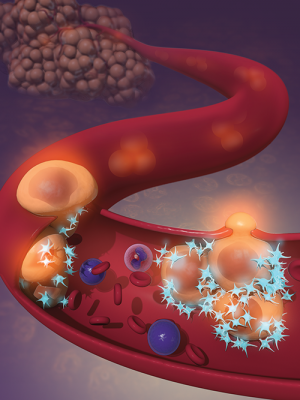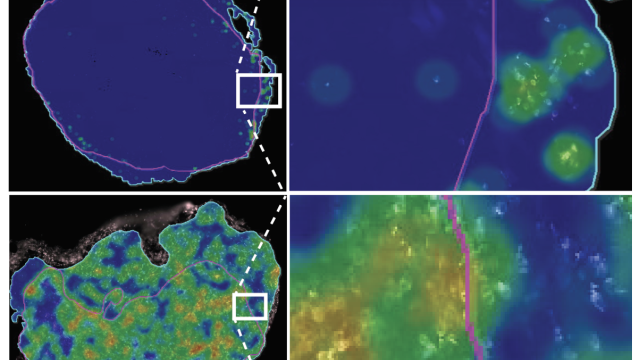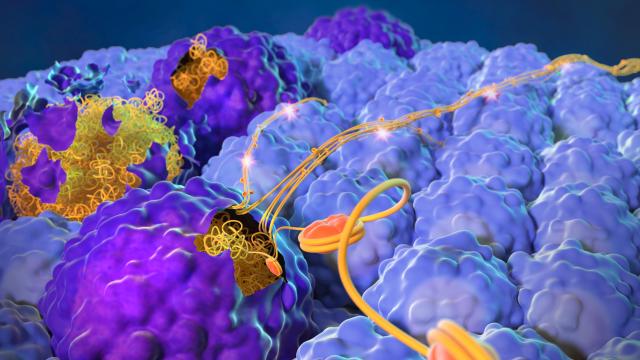A blood-clotting protein on the surface of tumor cells enables metastasis, the leading cause of death in cancer patients.

In order to metastasize, cancer cells must enter the circulatory system and then exit at another site. CCR researchers have discovered that platelets (light blue) play a key enabling role in allowing cancer cells (orange) to escape blood vessels (red) in new locations away from the primary tumor (top left).
Credit: Veronica Falconieri Hays, Falconieri Visuals
CCR scientists have discovered that a protein on the surface of tumor cells activates blood-clotting cell fragments known as platelets, thus allowing tumor cells to spread to distant tissues in a process known as metastasis. Given that cancer metastasis is the leading cause of cancer-related deaths, the ability to inhibit this poorly understood process presents a potentially powerful approach to cancer treatment.
Earlier studies have shown that interactions between tumor cells and platelets in the blood played some role in metastasis, but how that happens has not been fully understood. In research published in Cell Reports, a team led by Kathleen Kelly, Ph.D., Chief of CCR’s Laboratory of Genitourinary Cancer Pathogenesis, hypothesized that a protein called CD97 plays a central role in this process. CD97 belongs to a class of proteins that can mediate adhesion between cells and resides at high levels in the cell membrane of tumor cells in several cancer types, including breast, prostate and thyroid cancer.
Kathleen Kelly, Ph.D.
Laboratory of Genitourinary
Cancer Pathogenesis
Using cultured cells, the researchers showed that CD97 activates platelets, causing them to release the signaling molecule lysophosphatidic acid (LPA), which, in turn, triggers the release of enzymes that allow tumor cells to more easily migrate through tissue. At the same time, these activated platelets make blood vessels more permeable, enabling the tumor cells circulating within them to escape into the surrounding tissue and to metastasize.
These findings were extended into a mouse model of thyroid cancer as well as in metastasis models using human prostate cancer cells and mouse breast cancer cells. In these in vivo settings, tumor cells needed to express CD97 in order to make blood vessels in the lungs more permeable and to form metastases.
The findings by Kelly and her team may point to a new target in research efforts to stop or slow metastasis. The team’s study suggests that blocking the interaction between CD97 and platelets could prevent metastasis.
In order to metastasize, cancer cells must enter the circulatory system and then exit at another site. CCR researchers have discovered that platelets (light blue) play a key enabling role in allowing cancer cells (orange) to escape blood vessels (red) in new locations away from the primary tumor (top left).
Credit: Veronica Falconieri Hays, Falconieri Visuals



